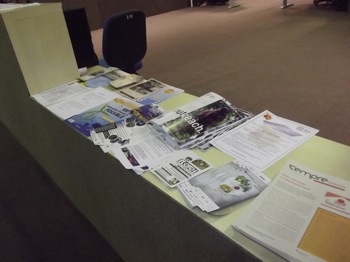By Thalif Deen
RIO DE JANEIRO, Jun 18 (TerraViva) – One of the world’s largest “paper factories” – a dubious title traditionally conferred on the United Nations – is on the verge of running out of business.
The world body, which now calls itself “Paper Smart”, has drastically cut down its paper output. Virtually every single document is now being transmitted electronically – a decision taken by Secretary-General Ban Ki-moon.
The United Nations says it is putting sustainable development into practice at the Rio+20 summit, which runs Jun. 20-22, through its Paper Smart initiative to minimise both paper use and the conference’s overall carbon footprint by encouraging the use of digital documents.

Despite the United Nations' "Paper Smart" initiative, the Rio+20 conference on sustainable development appears more paper and less smart here. Credit: Diana Cariboni/IPS
“There will be extremely limited print-on demand (sic) services when needed,” it warned.
In a bygone era, hundreds and thousands of press releases and voluminous U.N. reports came uninterruptedly from the paper mill in the Secretariat in New York. And at the end of the day, the reports ended up in a garbage dump – or, more recently, in a recycling bin.
No longer, says a U.N. official. “We produce paper only on demand,” said Magnus Olafsson, director of the U.N. Meetings and Publishing Division at the Department for General Assembly and Conference Management.
In an interview with IPS, he pointed out that the 132-member Group of 77 developing countries, the largest single coalition at the United Nations, requested only six printed pages of a 40-page document during the negotiations at Rio+20.
“If we succeed”, he said, it will be the wave of the future. “The reaction from member states has been very
positive,” he added.
When the Preparatory Committee (PrepCom) began negotiations early this year, the original document, called the zero draft, was 6,000 pages long. The final outcome document will be 49 pages – all in electronic format.
The Rio+20 summit, also known as the U.N. Conference on Sustainable Development, is the first major U.N. conference that has gone digital.
The United Nations, which has been critical of conspicuous consumption in the context of the global environment, is apparently practising in its own backyard what it preaches to the outside world.
During the PrepCom meetings in New York, delegates were encouraged to carry their mobile devices, including tablets, to avail themselves of the Paper Smart Portal, available at http://papersmart.un.org.
Perhaps the ultimate compliment came from Joseph Torsella, U.S. Ambassador for U.N. management and reform, who told delegates in New York recently: “We have evidence and experience on our side: we know reform can succeed at the U.N. because we can see where it already ha.s.
“We see the unsung heroes in the U.N.’s Department of General Assembly and Conference Services Management who’ve been pushing toward a paper-smart U.N. So far, they have reduced UN printing by 65 percent in just two years, saving each year a pile of a paper 49 times as tall as the (39-storeyed) Secretariat building, and a pile of money too.”







 Add to Google
Add to Google







